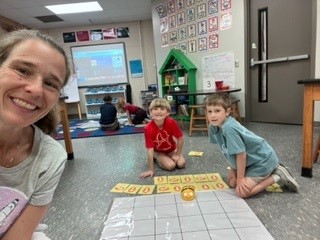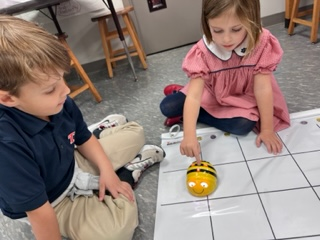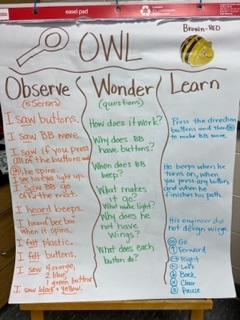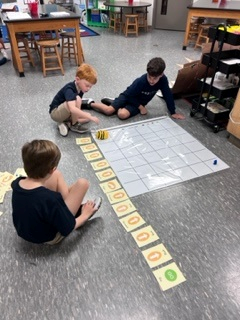Jamie Shelton, Alabama AEM
Posted on April 29, 2024 at 5:58 PM by Virginia Smith
 |
|
Jamie Shelton is a STEAM teacher who works with kindergarten through 5th grade students in Montgomery, Alabama. |
April 29, 2024
Meet Jamie Shelton. She is a STEAM teacher at Trinity Presbyterian School, a K-12 private school in Montgomery, Alabama. Specifically, she is a lower school STEAM teacher, teaching some of the youngest learners about science, technology, engineering, art and mathematics. Only in her first year as a Civil Air Patrol Aerospace Education Member (AEM), she has already found benefits of being a member by using the STEM Kit program. "Bee-bot is my first CAP STEM Kit," she says. "I used this with kindergarten and first-grade students. The lesson plans provided with the kit were helpful in organizing the instruction." After 25 years, she retired from public school and began teaching at Trinity. At a friend's suggestion, she joined CAP as an educator member. What she likes about teaching STEAM, she says, is that it "amplifies and encourages these things: love for learning, hands-on instruction, and ownership. I want to provide an environment where kids WANT to come!" We asked her some questions about her teaching and her experience with CAP. Her answers follow.
Tell us about your current school and your role there.
I currently teach at Trinity Presbyterian School. It is a K4-12 private school in Montgomery, Alabama. I teach STEAM to grades K4-5th. This is the first year of STEAM instruction in the lower school. Our school’s mission is to glorify God by providing for students the highest quality, college-preparatory education, training them in the biblical world and life view, thus enabling them to serve God in spirit, mind, and body.
How many years have you been an educator?
I have been teaching for 27 years. I started out in early childhood special education. Starting out, I worked at Auburn (Alabama) Early Education Center. I began in special education and transitioned into the regular classroom. While being a strong literacy-based school, it was also excellent at project-based learning. At that time, it was a kindergarten-only school. I loved facilitating projects with young students. Looking back, there was a close correlation with some of the project-based learning and STEM instruction. For example, our team of teachers facilitated students “traveling” to other countries each year. Sometimes, students “traveled by airplane.” Sometimes, students “traveled by cruise ship.” This collaboration with other teachers and students was exciting and meaningful. Each classroom created a different part of the cruise ship or plane. Once, our class created a game room. They researched games and materials, made plans, used science standards to drive the projects. They ended up making mini golf and Skee-Ball stations, using motion, friction, and force. Another time, students created the cockpit of a plane.
Fast forward a few years -- an opportunity arose to pioneer a new school system with hopes of using project-based, as well as standards-based
 |
|
Jamie Shelton's students work with the CAP Bee-bot STEM Kit, Shelton has seen the benefits of using Bee-bots with her students to help them learn programming. |
instruction. So, we relocated to the Pike Road/Montgomery area. After 25 years in the classroom, in 2022, I retired from public education and began teaching for a smaller private school, Trinity. I taught first grade for one year and then moved into a new position as the lower school STEAM educator. This is a new role and one that I am LOVING! There are so many possibilities. I enjoy working with several grade levels and seeing the abilities and interests at each age.
What is your philosophy of teaching?
I believe that learning should be fun. I think students learn best with structure, discovery, conversation, reflection. I think classrooms should be noisy, not silent or chaotic. I think environments and plans should be inviting and stimulate curiosity. I believe we are all life-long learners. Our core values at Trinity include Service, Integrity, Respect, Responsibility and Growth. These core values attained make a pretty great human.
Please list awards/honors/achievements you have received as an educator that you would like to include.
● Awarded Pike Road Schools Teacher of the Year (2019-2020)
● Seesaw Ambassador (2017-2021)
● Awarded Teacher of the Month from Montgomery Parents Magazine (Nov/Dec 2018)
● Co-authored and awarded USDA Specialty Crop Block Grant (2016/2017)
● Awarded DonorsChoose Grants (2014-2015) for reading/school connection texts
● Awarded FACES Grants (2014-2015) portable science lab; FACES Grant (2012-2013) for Wii game systems;
FACES Grant (2009-2010) for incorporating green house into science lab; FACES Grant (2002-2003) for
incorporating independence within the special education; FACES Grant (2002-2003) for providing special
education student technological access.
● Awarded Adopt-a-classroom grant (2013-2014)
● Selected as Auburn Early Education Center’s Teacher of the Year (2008-2009)
Please describe your experience with Civil Air Patrol's STEM Kit program?
Bee-bot is my first CAP STEM Kit. I used this with kindergarten and first-grade students. The lesson plans provided with the kit were helpful in organizing the instruction. We started out with free exploration. This is so important with young students. They want to touch buttons, try things, and figure stuff out. We made OWL (Observe, Wonder, Learn) charts. Students learned about algorithms (yes, algorithms in K and 1st) with direction cards. Students took turns being the designer, the organizer, and programmer. The designer made paths and obstacles. The organizer determined steps in algorithm. The programmer pushed buttons to make Bee-bot work. Students learned collaboration, technology, and robotics. I look forward to trying other STEM kits with other age groups!
How many years have you been involved in Civil Air Patrol?
This is my first year with CAP. I have been so excited about the kits and look forward to learning more.
How did you get involved in the Civil Air Patrol AEM program?
I have a friend who suggested it. I thought I would give it a try.
Why do you teach in the Aerospace Education/STEM area?
When I was in the regular classroom, I felt like there was a strong push for reading and math, especially in younger years. I felt like science was often put on the back burner to make more time for reading and math, mostly in order to meet testing requirements. Previously working in project-based instruction, I loved watching kids DO! I loved their excitement for learning. They took ownership over their accomplishments. Their learning was hands-on. STEAM amplifies and encourages these things: love for learning, hands-on instruction, and ownership. I want to provide an environment where kids WANT to come!
What do you and/or your students like about Civil Air Patrol programs/materials?
CAP programs/materials provide kids with varying experiences. They can work with circuits. They can program robots. They can do so many things. That’s what I love! They can DO! It is not sit and get. It is not, “here’s another worksheet.” IT IS…see what you can discover, let’s ask questions, let’s record and share our findings!
What is the best advice you have for a new AEM working with CAP programs and materials?
My best advice and what I am currently doing is …take it slow. Don’t be in a hurry. Make sure the instruction is solid, that the understanding is deep. Take one kit at a time. Learn with your students. It's OK to not know everything.
 |
 |



